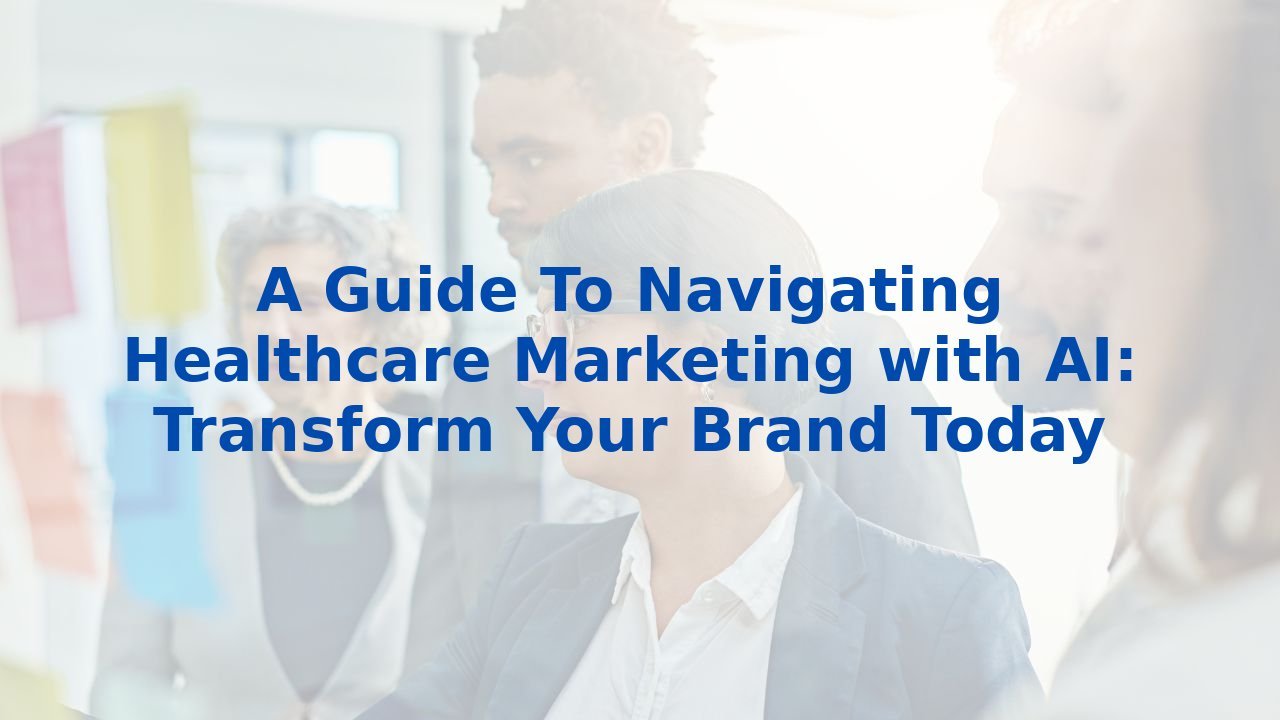A Guide To Navigating Healthcare Marketing with AI: Transform Your Brand Today
A Guide To Navigating Healthcare Marketing with AI: Transform Your Brand Today
Introduction
Navigating healthcare marketing can feel like traversing a complex maze, but with a clear strategy, you can emerge not just unscathed, but transformed. In our ever-evolving healthcare landscape, utilizing Artificial Intelligence (AI) isn't just an option—it’s an essential element for enhancing efficiency, personalizing campaigns, and elevating patient engagement. In this guide, we'll delve into practical insights and the undeniable benefits of integrating AI within your healthcare marketing strategy.
Understanding AI in Healthcare Marketing
AI is more than a buzzword; it represents a powerful shift that's reshaping the landscape of healthcare marketing. At its core, AI embodies a machine's ability to perform tasks requiring human-level intelligence, such as reasoning, problem-solving, and understanding language. By harnessing this technology, healthcare marketers can streamline operations, deliver personalized messages, and ultimately improve the patient experience.
Practical Steps to Use AI in Healthcare Marketing
1. Campaign Ideation
Personalization: The first step in generating effective campaigns is personalization. AI can streamline this process by analyzing patient data to craft tailored content for service lines or health education campaigns, saving valuable time while significantly boosting patient engagement.
Automation: With the repetitive and time-consuming tasks of A/B testing and subject line writing being automated by AI, marketers can focus on what truly matters—optimizing campaigns and digital strategies that resonate deeply with patients.
2. Data Validation
Efficiency and Effectiveness: By leveraging AI, healthcare organizations can enhance the efficiency of their marketing efforts. Understanding patient needs more deeply allows marketers to tailor services and optimize campaigns, resulting in higher returns on investment.
Cost Reduction: With many AI tools being accessible at little to no cost, embracing AI becomes an attractive option for organizations aiming to cut marketing costs without sacrificing quality.
3. Predictive Analytics
Patient Insights: AI-driven predictive analytics can identify patients at risk for certain illnesses, enabling healthcare providers to implement proactive treatments. This not only saves lives but can also significantly reduce healthcare expenses.
Personalized Treatment: AI has the capability of customizing treatment regimens based on a patient's unique genetic makeup, medical history, and lifestyle, optimizing therapeutic efficacy and minimizing potential adverse effects.
4. Content Creation and Distribution
Content Individualization: AI empowers marketers to identify which content types resonate best with their audience. Whether it’s an article, video, or social media post, AI ensures every piece is not only relevant but also engaging.
Optimization for Voice Search: As voice search technology becomes increasingly prevalent, optimizing content is vital. AI's analysis capabilities can identify trending search queries among patients, guiding the development of targeted content.
5. Streamlining Operations
Automation of Administrative Tasks: Administrative processes, including billing, insurance claims, and appointment scheduling, can be expedited through AI, leading to reduced operational expenses and an improved overall patient experience.
Real-Time Performance Analysis: With real-time analysis of marketing campaigns, AI provides ongoing insights into campaign effectiveness. This allows for timely adjustments, optimizing marketing efforts to ensure maximum ROI.
The Benefits of Training Your Employees for AI
While AI represents a powerful tool for transformation, its effectiveness is profoundly enhanced when employees are equipped with the right training. Here’s why investing in AI training for your team is imperative:
- Enhanced Efficiency: Employees trained in AI can utilize tools more effectively, automating routine tasks and freeing their time for strategic initiatives.
- Improved Decision-Making: Employees with a solid grasp of AI can rely on data-driven insights, leading to more informed and effective decision-making.
- Better Patient Engagement: Knowledgeable staff can craft personalized content and messages that resonate with patients, amplifying engagement levels and satisfaction.
Conclusion
In conclusion, navigating healthcare marketing with AI isn’t merely about adopting cutting-edge technologies; it’s about reimagining your brand's potential. By embracing AI's capabilities—and understanding the practicality of its application—you can enhance efficiency, personalize campaigns, and significantly improve patient engagement.
In this competitive landscape, the integration of AI isn’t just a trend; it’s a necessity. The opportunities for refining your strategies and forging genuine connections with your target audience are boundless. The future of healthcare marketing is not a distant notion—it's happening now and it's profoundly shaped by AI.



